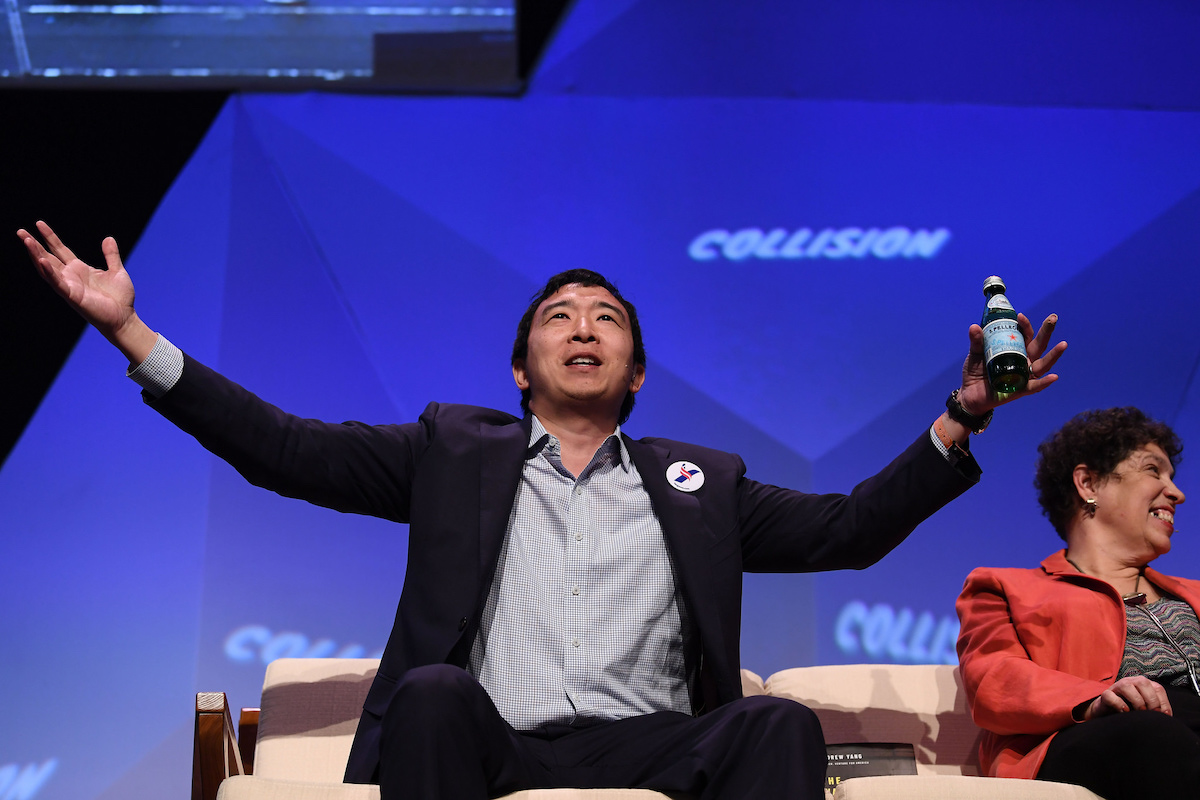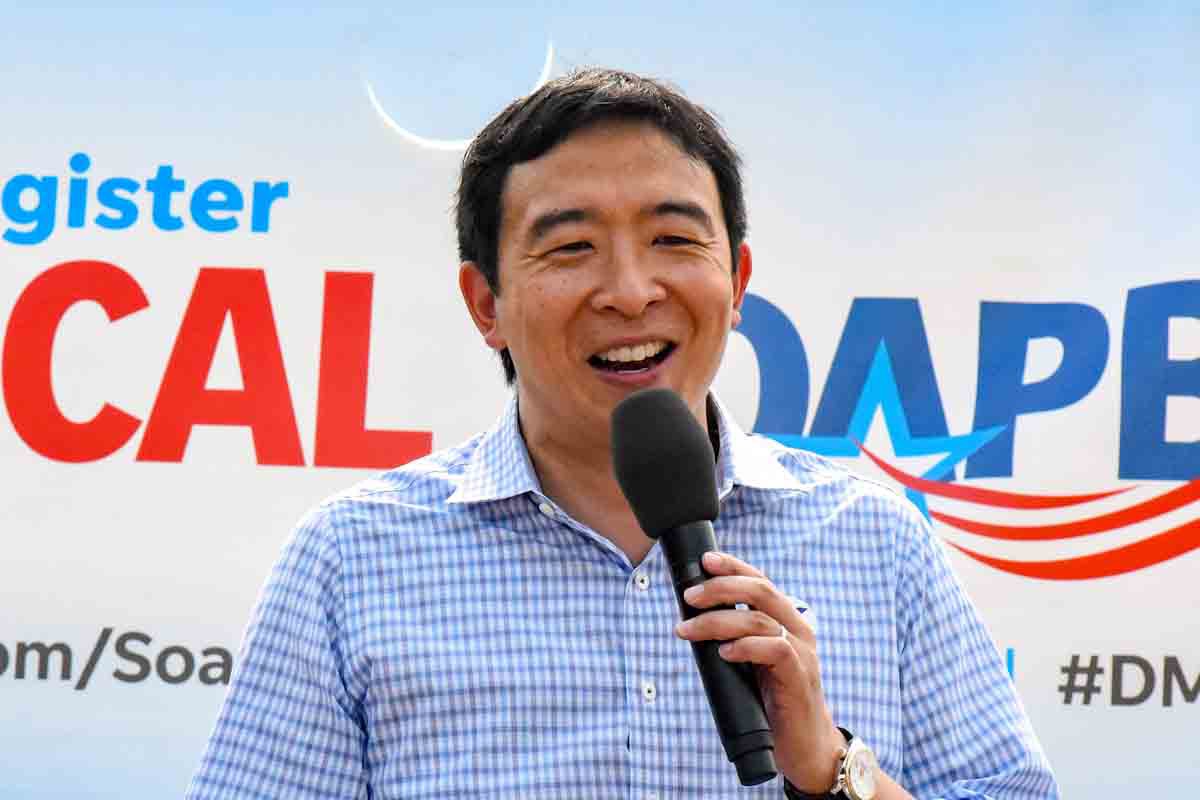recent
In Defense of Andrew Yang's Freedom Dividend
To provide 1000 dollars a month to every American citizen today, the headline cost would be about $2.4 trillion a year.

We should replace the ragbag of specific welfare programs with a single comprehensive program of income supplements in cash — a negative income tax. It would provide an assured minimum to all persons in need, regardless of the reasons for their need…A negative income tax provides comprehensive reform which would do more efficiently and humanely what our present welfare system does so inefficiently and inhumanely.
~Milton Friedman
I get emotional about facts.
~Andrew Yang
Although we are still a long way from the 2020 presidential campaigns, whispers of who the Democratic candidates will be and what policy platforms will be adopted is steadily droning into an orchestra. We can already predict some of the names that are likely to appear on the ballot sheet and the talking points that will be heard on the campaign trail, and it would not be imprudent to suspect the upcoming election will be even uglier and more contentious than the last. While the overwhelming majority of political pundits seem to be pouring their energies into slamming the current president—criticizing old models rather than conjuring new ones—many are wondering what will be left standing in the wake of yet another crashing political wave.
Onto the scene struts presidential candidate and serial entrepreneur Andrew Yang, whose growing popularity was recently capped with an appearance on Joe Rogan’s herculean podcast. The reception was overwhelmingly positive. Yang is running on a Universal Basic Income platform, a policy proposal whereby $1000 dollars a month will be allocated to every U.S. citizen, in response to the impending proliferation of Artificial Intelligence and automation that is projected to cause massive job displacement in the next decade.
There are reasonable arguments to be leveled in good faith against the UBI platform, which Yang has dubbed “The Freedom Dividend,” but what was once considered a utopian pipedream is beginning to sound more plausible in light of the unfolding tectonic economic and technological shifts. At a minimum, it is well worth digesting Yang’s diagnosis of the problem in detail, whether or not we agree with his solution.
We are in the third inning of what Yang calls “The Great Displacement.” Between 2000 and 2015, America automated away 4 million manufacturing jobs (four times the amount lost to globalization), many of which were in swing states Donald Trump won in the 2016 election. Many more jobs are projected to disappear in the transportation, retail, call center, food service, and even clerical and administrative sectors due to the ongoing advances in autonomous technologies. The wave is coming. A report published during Obama’s final days in office predicted that 83 percent of jobs where people make less than $20 an hour will be subject to automation or replacement in the near future, and between 2.2 and 3.1 million driving jobs in the US will be eliminated by the advent of self-driving vehicles.
To make matters worse, the projections for job loss due to automation are pretty consistent across the board—coalescing at about 20–30 percent of jobs being subject to automation by 2030 among various research and financial institutions (Bain Capital, McKinsey, MIT)—which means the projections are probably accurate. All the while, GDP has risen over 3 trillion dollars in the last few years amidst these vast technological developments. En masse, America is the richest country in the world.
To add insult to injury, the American economy is less dynamic than ever before. The job participation rate is at 62.9 percent today, below nearly all other industrialized economies. People are less and less inclined to start a business, with 100,000 fewer businesses sprouting up per year than was the rate just 12 years ago. Furthermore, 59 percent of American counties watched more businesses close than open between 2010 and 2014. Americans move from state to state and change jobs at lower rates than at any point in the last few decades. A Bankrate survey conducted in 2017 found that 57 percent of Americans don’t have enough savings to pay an unexpected bill of 500 dollars. Meanwhile, drug overdoses have risen above car accidents as the most likely accidental cause of death for Americans, and suicide has risen so sharply that it has actually lowered the national life expectancy rate. The decay and despair is palpable to anyone who walks around an American city not handsomely nestled in a coastal bubble.
So why is basic income the answer to these problems? The Freedom Dividend is not Yang’s only proposed solution, in fact he has 75 other policy initiatives listed on his website including remodulating our measurements of GDP and instituting digital social credits as a local currency. But UBI is central to his campaign, proposed with the intention of giving American citizens much needed fiscal breathing room and making the requisite adjustments to the massive technological and economic transformation on the horizon. One thing is clear: We cannot continue on our present course without addressing “The Great Displacement” in some shape or form through public policy, and there is little evidence to suggest the market will spontaneously adjust to these immense changes.
There are three major critiques of Universal Basic Income: Cost, Inflation, and Incentive.
To provide 1000 dollars a month to every American citizen today, the headline cost would be about $2.4 trillion a year. The federal budget is around $4 trillion a year, distributed between mandatory spending (i.e. Social Security and Medicare—about $2.4 trillion), discretionary spending (i.e. military programs—about $1.11 trillion), and interest on federal debt (about $364 billion). With that in mind, $2.4 trillion sounds pretty steep.
But there are other avenues through which UBI could be paid for. If the gains from artificial intelligence and new technologies were harnessed, there would be a surplus of wealth to invest into the economy. Yang has proposed instituting a value added tax on all goods and services, at every level of production and distribution, putting the onus on large companies who benefit most from automation.
This is estimated to generate almost $1 trillion in national revenue, and when we take into account the $800 billion spent on welfare that would decrease in the wake of UBI, along with the tax revenue generated from the extra $1000 a month circulating back into the economy and the 100s of billions that would be saved in healthcare, incarceration, and homelessness services, the Freedom Dividend could end up paying for itself. That is not to mention the potential value gains from having a population with higher rates of education, health, nutrition, and productivity that are estimated to improve with UBI according to a number of studies on already existent trial runs. (The state of Alaska, the leading example, instituted a dividend for its citizens over 30 years ago primarily funded by oil money, and Yang is quick to note that technology is the oil of the twenty-first century.)
That is optimistic. Allocating funds from the myriad social programs already in place into a UBI could prove to be a dicey process, and taxing powerful corporations has never been child’s play. Another issue often brought up against a UBI platform is the prospect of inflation. If more wealth is being distributed across the population, won’t that make for increased prices and lead to a decrease in the value of money?
According to Yang, inflation has been low for years because globalization and technology have been helping reduce the cost of goods and services, and there is no good reason to believe that trend wont continue. Even after the 2008 financial crisis, when the U.S. government printed $4 trillion, we have not seen a meaningful rise in inflation. If the Freedom Dividend were indeed able to pay for itself through a value added tax, the liquidation of other social services, and a general stimulation of the economy (the Roosevelt Institute estimates economic growth of about 13 percent and an increase in the labor force by about 4.5 million people), the money supply circulating in society would not increase substantially. This would produce little to no inflation. Yang also points out that the central areas of inflation tend to fall into the protected dysfunctional markets of housing, health care, and education rather than consumer goods where prices are actually falling.

Finally, one of the most common and reflexive arguments leveled against UBI is that it mirrors the fundamental flaw of the Welfare State: the absence of a stable incentive structure. If every American citizen is going to receive free money with not a single qualification or requirement, won’t we all just become more lazy? I find this to be the least compelling argument against UBI, largely because it fails to acknowledge the actual problem with welfare policies. The issue with welfare is not that it creates no incentive, it is that it creates a disincentive. If a person is on disability, for example, getting better would mean getting off the dole, so there is actually an incentive not to re-enter the job market. If a single mother is on welfare and bringing a husband into the picture will suspend that monthly check, then she will be less inclined to find a husband. It is subtle shift in one’s thought process that enhances an underlying feeling of dependency. The issue with welfare is not that it’s free money; the issue is that the requirements necessary to receive welfare benefits tend to reward failure and punish success.
Of course, there are always going to be lazy people who will take advantage of a free lunch, but that is entirely on them. $1000 a month is not enough to incentivize people to leave their jobs. Human beings are more forward thinking and goal-oriented when there is hope for a better future, and that is harder to come by when we are drowning in bills and stress. People who are uncertain of the future and insecure in the present are not going to be the ones starting a business. A number of studies have shown how the prospect of an unpaid bill can lower IQ and shorten our cognitive bandwidth. It is generally those people who are already financially secure who are more inclined to take an entrepreneurial risk. So, there is more reason to believe a UBI will create a positive incentive structure than a negative one. At the very least, it should not have much effect on incentive at all and will largely reflect things as they already are.
This is not a silver bullet. But what I like most about Andrew Yang and his presidential campaign is that he is approaching modern problems with modern solutions while other candidates either grasp onto an idealized past or dredge up historical grievance. He breaks through the capitalism/socialism paradigm with ideas that could be placed on either side of the aisle, bolstering entrepreneurialism and economic development while also offering aid and support to those who have been caught in the tailwind of the market. His rapidly growing popularity is a testament to his humanist approach to politics and the growing disdain among the American public towards media polarization and identity politics promulgated by the elite stratospheres of society. The silent majority is being roused into consciousness. And that is a good thing.






